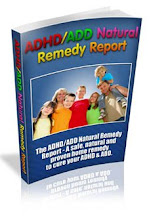If your child has been diagnosed with ADD or ADHD you may be wondering if that means that he is learning disabled as well?
Well, not exactly.
When we talk of the term 'learning disability' then what we generally mean is that it is a perceptual disability - such as autism or visual processing disorder.
Attention Deficit Disorder (With or without hyperactivity) shouldn't be treated as a learning disability.
Anyone who has ADD is perfectly capable of understanding and using the information presented to them.
ADD doesn't really obstruct the learning process although it can sure feel like it at times.
It is often mistakenly lumped together with other learning disabilities into 1 category. A person who is suffering from ADD can take in the information he sees and then he can process it and even store it in his memory just like any other person.
Then what's the problem, you may ask. The problem with a person with ADD is attracting and holding his attention for long enough so that he can absorb the information to begin with.This leads to all kinds of problems, at school, at home and for adult ADD sufferers, in the workplace as well.
Once he is able to focus and concentrate, his performance in school, at home and in the workplaically improve.
But sometimes ADD or ADHD can co-exist or be mistaken for a learning disability or some other processing disorder. Dyslexia, auditory, vision and speech problems could all be mistaken for ADD, or a child might have ADD and one of these problems as well. A thorough check-up by a pediatrician will help immensely.These problems must first be rules out before treatment for ADD is sought.
Once you are sure that your child is indeed suffering from ADD, then you need to consider all the various treatment options, such as medication, supplementation, brainwave entrainment, behavior modification or a complete holistic treatment option that combines many of the methods above.
But no matter what treatment option you choose, here are some tips that will benefit ALL kids with ADD:
1. A regular daily routine- bath time, mealtimes, bedtimes, homework time and so on happening at the same time each day. This repetition and familiarity helps a child remember what needs to be done when.
2."A Place for everything and everything in it's place" is a good motto for someone with ADD. Help your child get organized and stay organized.
3. Having a homework diary helps the child with ADD to remember what homework needs to be done as well as what assignments and other school events he may need to prepare for.
4. In the classroom, a teacher who invites interaction with the ADD pupil will find that he understands and retains the material far better than if she had just delivered a lecture.
And most of all, don't loose hope. Educate yourself about ADD and learn all you can about managing it as well as possible, then teach these coping skills to your child, and he is sure to thrive.
Spiga
Resources and Sites Of Interest
Attention Deficit Disorder Info This blog covers all sorts of information about attention deficit disorder in children - ADD treatment options, ADD Myths, Tips for dealing with attention deficit disorder and living with ADHD. If you want to know more about parenting a child with Attention Deficit Disorder & Attention Deficit Hyperactive Disorder this is the blog for you.
Is ADD /ADHD a learning disability?
Saturday, February 16, 2008 at 12:56 PM Posted by Maximindpower
Labels: ADD, learning disability
Subscribe to:
Post Comments (Atom)
Search
Labels
- A.D.D. A.D.H.D. (1)
- ADD (4)
- ADD ADD cure ADD in children ADD in kids ADD remedy. ADHD attention deficit disorder attention hyperactive deficit DISORDER (10)
- ADD child in school (3)
- ADD cure (1)
- ADD cure ADD in children ADD in kids ADD remedy. ADHD attention deficit disorder attention hyperactive deficit DISORDER (12)
- ADD Diagnosis (1)
- ADD diet (2)
- add discipline (1)
- add forums (1)
- ADD in children (4)
- ADD in kids (1)
- ADD in school child (1)
- add kids homework (1)
- ADD remedy. (1)
- add statistics (1)
- add stats (1)
- ADD support groups (1)
- ADHD (2)
- ADHD Diet (1)
- adhd kids homework (1)
- attention deficit disorder (2)
- attention hyperactive deficit disorder (1)
- Balanced Breakfast (1)
- building self-esteem (1)
- causes of ADHD (1)
- causes of attention deficit disorder (1)
- christmas season (3)
- conditions that coexist with ADD (1)
- discipline (2)
- exercise (1)
- impact of add / adhd on marriage (1)
- impact of add /adhd on the family (1)
- learning disability (1)
- MEMORY (1)
- Parenting (3)
- parenting the ADD child (19)
- parents feelings (1)
- school ADD (1)
- school and the ADHD Child (1)
- sibling rivalry and add /adhd (1)
- social implications of add (1)
- social implications of attention deficit disorder (1)
- STUDY TIPS (1)
- teaching ADD child (1)
- teaching child wih attention deficit disorder (1)
- teaching the ADD /ADHD child (1)
- what causes ADD (1)
Meta
Recommended Books On Amazon
Blog Archive
-
▼
2008
(63)
-
▼
February
(12)
- Parenting The ADD Child: Change Your Focus To Impr...
- Parenting The ADD Child: Getting your Child To Lis...
- How can behavior modification help my child with a...
- What are your feelings about Your Child's ADD Diag...
- What The Real Cause of ADD / ADHD?
- The social implications that accompany attention d...
- Attitutor Blog: An Attention Deficit Disorder Story
- Teaching A Child With Attention Deficit Disorder
- Quick and Healthy Breakfasts For Your ADD Kids...O...
- 4 Ways to Help Your Child With ADD
- Is ADD /ADHD a learning disability?
- Is Attention Deficit Disorder A Learning Disability?
-
▼
February
(12)










0 comments:
Post a Comment